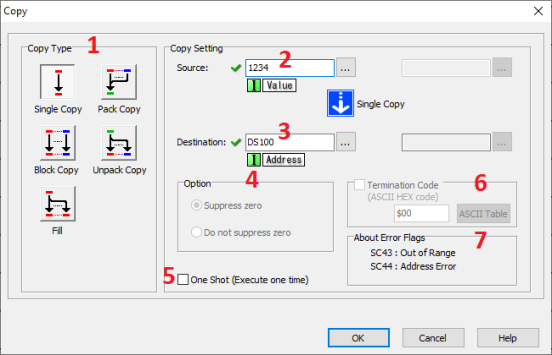Topic: CL173

| Copy Instruction: Single Copy |
Topic: CL173
|
The SingleCopy instruction is used to copy a data or text value from its Source location to a specified Destination register. The Source location of the data or text can be another register, identified by its MemoryAddress, or it can be a constant value typed directly into the Source field on the dialog. The Single Copy instruction allows you to copy numerical text values to one or more data registers as integer values.
| Destination | |||||||||||||
|
Bits |
Registers |
||||||||||||
|
Y |
C |
DS |
DD |
DH |
DF |
YD |
TD |
CTD |
SD |
TXT |
|||
| Source |
Bits |
X, Y, T, CT, SC |
● |
● |
|
|
|
|
|
|
|
|
|
|
C |
● |
● |
|
|
|
|
|
|
|
|
|
||
|
Registers |
DS |
|
|
● |
● |
● |
● |
● |
● |
● |
● |
● |
|
|
DD |
|
|
● |
● |
● |
● |
● |
● |
● |
● |
● |
||
|
DH |
|
|
● |
● |
● |
● |
● |
● |
● |
● |
● |
||
|
DF |
|
|
● |
● |
● |
● |
● |
● |
● |
● |
● |
||
|
XD, YD, TD, CTD |
|
|
● |
● |
● |
● |
● |
● |
● |
● |
● |
||
|
SD |
|
|
● |
● |
● |
● |
● |
● |
● |
● |
● |
||
|
TXT |
|
|
● |
● |
● |
● |
● |
● |
● |
● |
● |
||
|
Constant |
Decimal, Hex |
|
|
● |
● |
● |
● |
● |
● |
● |
● |
● |
|
|
String, ASCII Code |
|
|
|
|
|
|
|
|
|
|
● |
||

1Copy Type: Select Single Copy to copy one Source value to a Destination location.
|
|
Note: In the case of text Source values, a single text string is copied to a specific number of consecutive registers. The number of registers is equal to the number of characters, including spaces, in the Source text string. (See example below.) |
|
2 Source: Identify the Source Memory Address or type a constant data or text value directly into the Source field. (See Data Types for the required typing conventions.)
3 Destination: Identify the Memory Address to which the data or text is to be copied. The Destination address must accommodate the Data Type of the Source entry.
4 Option: This Option is used with certain combinations of Source and Destination Data Types.
4a When the Source is Numeric and the Destination is Text:
Source = DS1 (The value is 123.)
Destination = TXT1
The option ‘Suppress zero’ is selected: TXT1-TXT3=”123”
The option ‘Do not Suppress zero’ is selected: TXT1-TXT5=”00123”
The option ‘Copy Binary’ is selected: TXT1=”{“ (123d or 7Bh)
4b When the Source is Text and the Destination is Numeric:

Source: TXT1 (The value is ‘5’)
Destination: DS1
The option ‘Copy Character Value’ is selected: DS1=5
The option ‘Copy ASCII Code Value’ is selected: DS1=53 (35h)
4c When the Source is Float and the Destination is Text:

Source = DF1 (The value is 10000)
Destination = TXT1
The option 'Real Numbering’ is selected: TXT1-TXT13=”10000.0000000”
The option ‘Exponential Numbering’ is selected: TXT1-TXT13=”1.0000000E+04”
5 One Shot: Choose One Shot to execute the Single Copy instruction one time when the enabling rung makes an OFF-to-ON transition. Otherwise the instruction will execute every scan. If One Shot is selected, the One Shot symbol will appear adjacent to the Coil in the Ladder Editor.
6 Termination Code: This option is supported by C0-1x and C2-x CPUs. When the Destination is Text Registers the Termination Code option becomes available. A single termination character can be added to the length of the Destination. Click on the checkbox to select and enter the ASCII Code in the field. Click on the ASCII Table button to open the ASCII Table shown below. Use this table to quickly select the desired ASCII Code.
7About Error Flag: SC43 and SC44 are Error Flags available for use in your program. SC43 Out of Range is valid for Single, Block, and Pack Copy modes. SC44 Address Error is valid for Single Copy mode when using a Pointer Address. The Source or Destination Pointer Address is out of range of the memory type.
|
|
Note: When
the Source is a
DH address type and the
option 'Do not Suppress zero' is
selected, the value in the DH address
is copied into 4 TXT addresses. |
|
Example Program 1: Copy Decimal Data Constant
In the following example, when X001 is ON, the decimal constant, 1234, is copied to the Memory Address: DS100.

Example Program 2: Copy Hex Constant
In the following example, when X001 is ON, the hexadecimal constant, 1234h, is copied to the Memory Address: DH100.

Example Program 3: Copy Text
In the following example, when X001 is ON, the text value "ADC" is copied to the Memory Addresses: TXT 1 through TXT3.

Example Program 4: Copy an ASCII Code
In the following example, when X001 is ON, ASCII character $0D (CR) is copied to TXT1. See ASCII Table for the entire ASCII codes.

Example Program 5: Using Pointer Addressing
In the following example, DD[DS100] is the Pointer Addressing. When DS100 = 10, DD[DS100] is identical to DD10. When X001 is ON, the data in DS1 is copied to DD10.
